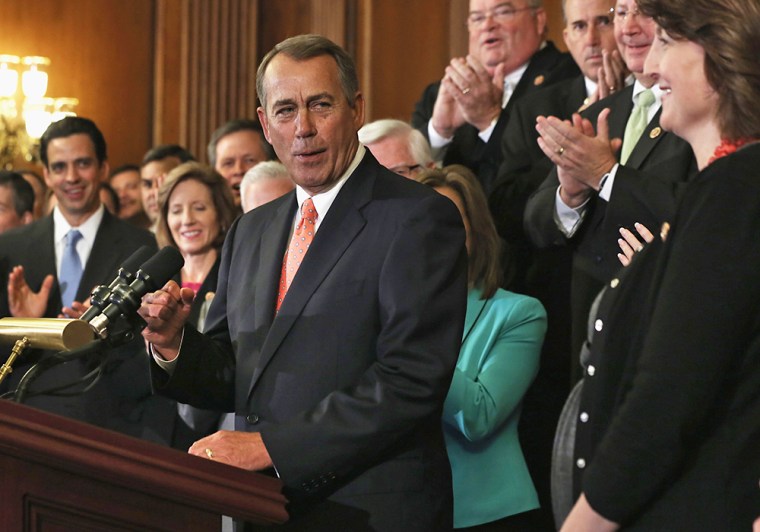The fate of a possible government shutdown now rests with the House of Representatives after the Senate voted Friday to send the GOP-dominated chamber a simple extension of government spending through mid-November.
After a week of bluster in the upper chamber which saw conservatives try to demand that spending for "Obamacare" be eradicated as a condition of avoiding a government shutdown, senators voted on a bipartisan basis to reject that ploy, and bring debate to a close.
The end result was that Democrats in the Senate were able to strip a provision to defund Obamacare from legislation to fund the government, which was passed a week earlier by the Republican-controlled House.
"Over the next three days, House Republicans will have to decide whether to join the Senate and keep the government open -- or shut it down because they get their way on an issue that has nothing to do with the deficit," President Barack Obama said Friday afternoon at the White House. "Even the threat of a shutdown is already probably having a dampening effect on our economy -- we saw that last time these kinds of shenanigans were happening up on Capitol Hill."
The debate now returns to the more politically fractious House, where the path toward reaching an agreement before the end of Monday -- when the government runs out of money to fund its day-to-day operations -- is anything but clear.
An aide to Speaker John Boehner, R-Ohio, called the president's remarks "grandstanding" and said the House "will take action that reflects the fundamental fact that Americans don't want a government shutdown and they don't want the train wreck that is Obamacare."
As the Senate concluded the debate, Majority Leader Harry Reid, D-Nev., urged his Republican colleagues in the House: "Defy the anarchists, respect the rule of law, and help the Senate govern."

The Senate voted 54 to 44 along party lines to ultimately approve a "clean" continuing resolution, which does nothing more than to preserve funding at existing levels through Nov. 15.
Conservatives, led by Texas Sen. Ted Cruz, had spent the week doggedly opposing this action. Cruz argued that any vote to support a clean stopgap spending measure was tantamount to a vote in support of Obamacare, putting many of his Republican colleagues in a politically difficult spot.
The Senate's vote now returns the spending debate to the House, where Boehner faces quite the bind.
With the clock winding down to a government shutdown, Boehner must figure out a path forward to fund the government, or risk a shutdown that could backfire politically against Republicans. And he has until midnight on Monday to do so.
The Republican speaker could bring up the legislation he's expected to receive from the Senate later Friday, known as a "clean" continuing resolution, because it preserves spending at existing levels through Nov. 15 without making any additional modifications to existing law. Boehner would have to rely heavily on Democrats, though, along with a handful of Republicans. This scenario would also mostly represent a political victory for President Barack Obama.
But Boehner already said Thursday that he could not envision House Republicans accepting such legislation, and would likely attach new provisions to the spending measure before sending it back to the Senate.
That means that Republicans, who will keep the House at work throughout the weekend, must work to craft their counter-offer to the Senate. Because Boehner will likely have to rely on Republican votes alone, that could mean GOP leaders will craft their new proposal in such a way that it will mollify House conservatives, who have been all too willing in the past to jilt Boehner on spending legislation.
The latter scenario would only heighten odds of a government shutdown.
The Senate, which is controlled by Democrats, is extremely unlikely to accept any legislation to continue funding the government if it is larded with conservative initiatives. The debate this week in the Senate -- which saw the chamber move slowly, but inevitably, to strip the defund-Obamacare provision from the House spending bill -- demonstrated that in vivid detail.
Indeed, Cruz expressed openly his hopes that Republicans would return new legislation to the Senate, where the fight would begin anew -- likely with an even shorter window of time before a shutdown.
"I remain confident -- hopeful and optimistic -- the House will stand their ground," Cruz said before the Senate votes, "which means this issue is coming back to the Senate."
Boehner has not formally signaled how he and Republican leaders in the House will proceed, preferring to preserve as many options as possible heading into political crunch time. House Republicans will meet on Saturday at noon to figure out their path forward.
The fact that House Republicans don't have their alternative at the ready means that the GOP could spend precious hours crafting their counter-offer and figuring out whether they even have the votes to send a new iteration back to their Senate colleagues.
Even after the budget issue is resolved, Congress faces the more vexing problem of how to raise the nation's debt limit. Many Republicans have turned to that battle, which must be resolved by Oct. 17, as a possible fallback deadline at which they could win concessions from Obama.
"Some Republicans have suggested that unless I agree to an even longer list of demands ... that they would push the button, throw America into default for the first time in history and risk throwing us back into a recession," Obama said. "I don't know how I can be more clear about this: nobody gets to threaten the full faith and credit of the United States just to extract political concessions."
NBC News' Carrie Dann, Luke Russert, and Frank Thorp contributed to this report.
